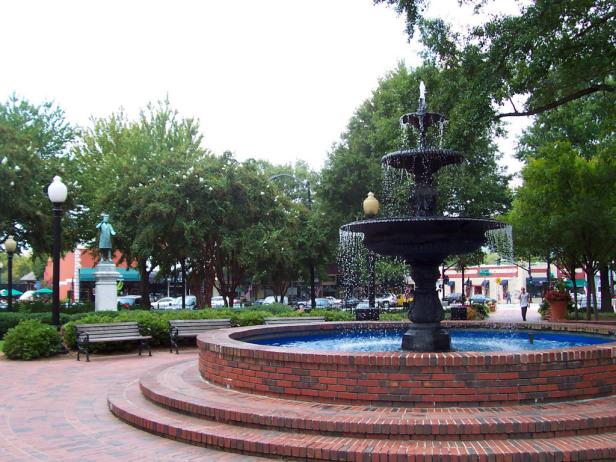Community Overview
Marietta, Georgia: What It's Like to Live Here

- With its strong schools, youth sports and great shopping, Marietta, Georgia, is the place to be for many families living in the Atlanta area.
Marietta is graced with a historic town square, five National Register Historic Districts, a dramatic mountain backdrop, and just enough mileage between it and Atlanta to give it the élan of a cosseted and well-heeled small town with the vibrancy of an urban environment.
A pocket-sized parcel 18 miles northwest of Atlanta, this county seat of Cobb County is rich in arts and culture, Civil War history and heritage. The Marietta Trolley offers one-hour, fully narrated tours Thursday-Sunday from Antebellum Square, past grand antebellum homes, to the battlefields at Kennesaw Mountain.
Purchase a Marietta Heritage Passport for savings on admission to the Marietta Museum of History, The Root House Museum, and the Marietta Gone With the Wind Museum: Scarlett on the Square. When visiting Marietta, make the Marietta Visitors Bureau located in the old Western & Atlantic Railroad Passenger Depot your first stop for local information.
Demographics:
As of the census of 2010, there were 56,641 people, and 22,261 households. The population density was 2,684.1 people per square mile (1,036.2/km2). There were 25,227 housing units at an average density of 1,152.6 per square mile (445.0/km2). The racial makeup of the city was 52.7% White, 31.5% African American, 0.1% Native American, 3.0% Asian, 0.1% Pacific Islander, 9.1% from other races, and 3.3% from two or more races. Hispanic or Latino of any race were 20.6% of the population.
There were 23,895 households, out of which 27.8% had children under 18 living with them, 35.4% were married couples living together, 13.8% had a female householder with no husband present, and 45.5% were non-families. 32.8% of all households were made up of individuals, and 6.9% had someone living alone who was 65 years of age or older. The average household size was 2.39, and the average family size was 3.05.
In the city, the population was distributed by age with 22.4% under the age of 18, 14.1% from 18 to 24, 39.4% from 25 to 44, 15.7% from 45 to 64, and 8.3% who were 65 years of age or older. The median age was 30 years. For every 100 females, there were 101.3 males. For every 101 females age 18 and over, there were 100.3 males.
Education:
All of the public schools in Marietta proper are operated by the Marietta City Schools (MCS), while the remainder of the schools in Cobb County, but outside the city limits, is operated by the Cobb County School District, including all of the county's other cities. MCS has one high school, Marietta High School, grades 9-12; a middle school, Marietta Middle School, grades 7 and 8; Marietta Sixth Grade Academy; and several elementary schools: A.L. Burruss, Dunleith, Hickory Hills, Lockheed, Marietta Center for Advanced Academics, Park Street, Sawyer Road, and West Side. Many residents of Marietta attend Cobb County public schools, such as Joseph Wheeler High School and Sprayberry High School. These schools are known to compete fiercely in athletics, especially basketball, as both Wheeler and Marietta High School frequently produce D-1 players. The town of Marietta is also home to the Walker School, a private pre-kindergarten through 12th-grade school. Walker competes in the Georgia High School Association Class A (Region 6) athletic division while Marietta and Wheeler compete in Class AAAAAA (Regions 4 and 5, respectively).
The school system employs 1,200 people. MCS is an International Baccalaureate (IB) World School district. In 2008, MCS became only the second IB World School district in Georgia authorized to offer the IB Middle Years Program (MYP) for grades 6-10. MCS is one of only a few school systems nationwide able to provide the full IB (K-12) continuum.
Kennesaw State University (Marietta Campus) formally Southern Polytechnic State University (SPSU), and Life University are located in Marietta, serving more than 20,000 students in more than 90 programs of study.
